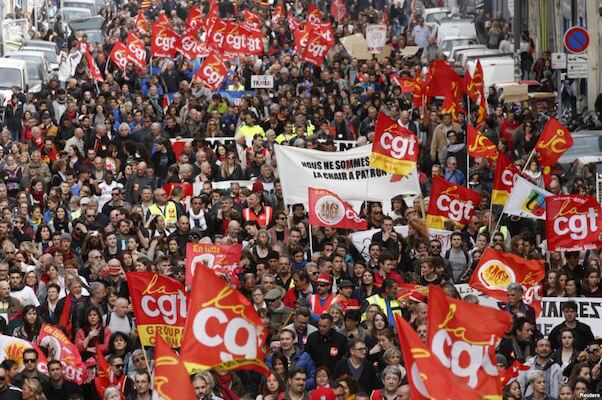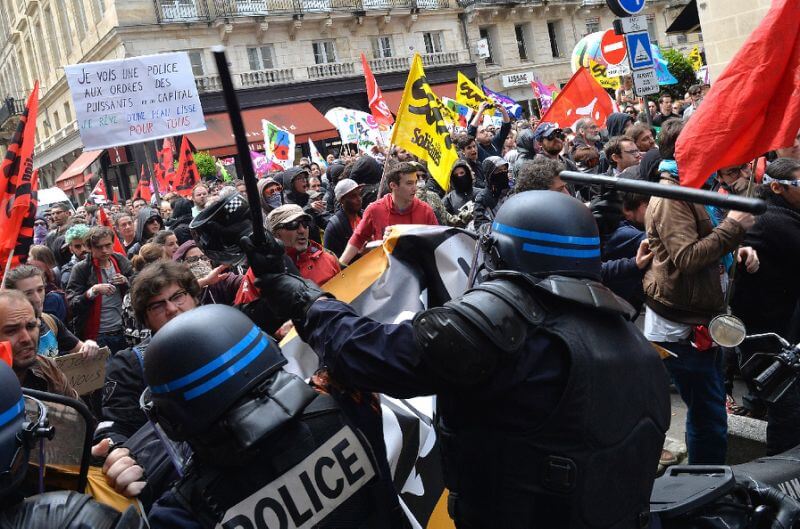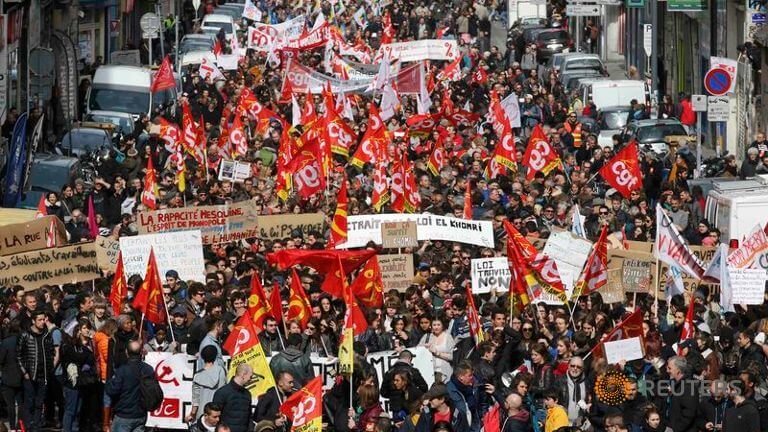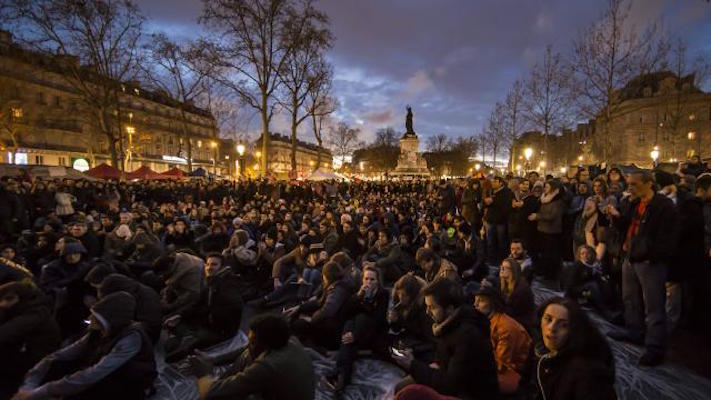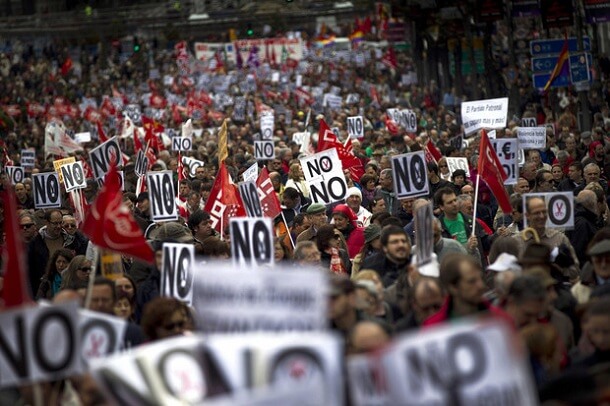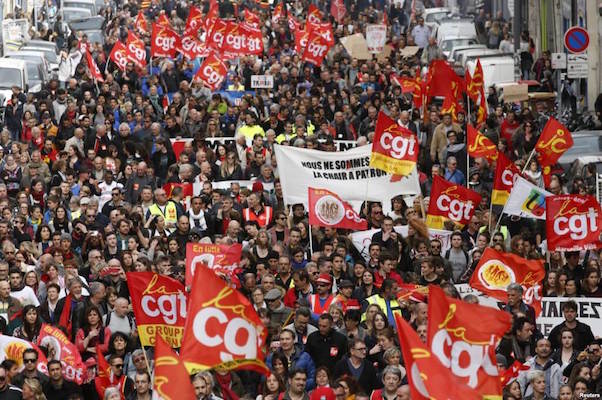French government seeks to crush strikes against labor law
By Alex Lantier
In the face of expanding strikes by refinery workers and truckers against the new French labor law, the Socialist Party (PS) government sent security forces yesterday to crush oil installation occupations and break the growing oppositional movement.
Since the beginning of the week, all of France’s refineries have gone on strike or shut down operations, and truckers have joined to blockade refineries and halt fuel deliveries to gas stations. Broader layers of workers are also moving into struggle. Some port, rail and autoworkers are already on strike, and the trade unions have issued strike calls and requested legal authorization for strikes from June 3 to June 5 at civil aviation facilities and for an unlimited strike against the Paris mass transit system starting June 2.
Early yesterday morning, security forces attacked some 200 members of the General Confederation of Labor (CGT) union who were blockading oil installations at Fos-sur-Mer, near Marseille. “The paramilitary police arrived around 4:30 am and used water cannon and tear gas,” said Olivier Mateu, the regional secretary of the Stalinist-controlled CGT.
Police assaults wounded a number of strikers, according to CGT sources, who denounced “virtual war scenes, with volleys of rubber bullets being fired to clear the blockade.”
“The police charges were incredibly violent,” said CGT-Petroleum National Secretary Emmanuel Lépine. Police authorities criticized “significant resistance” by the strikers to the repression, which left seven of their men slightly wounded.
After the clash between strikers and security forces ended, around 6 am, tanker trucks entered the site under police escort. The Fos-sur-Mer site, near France’s main oil port in Marseille, plays a critical role not only in France, but in all of Europe, supplying pipelines carrying petroleum to refineries in Cressier in Switzerland and Karlsruhe in Germany.
Despite the brutal repression of the protests, the expanding mobilization of workers has staggered and destabilized the PS government. Yesterday, Transport Minister Alain Vidalies said 20 percent of France’s 12,000 gas stations either had “totally run dry or faced shortages of one or two products.”
Trampling on the right to strike, which is inscribed in the French Constitution, the PS is provocatively threatening to crush strikes and blockades across France. On Monday, Prime Minister Manuel Valls said, “We are totally in control of the situation. I think that a certain number of refineries and fuel depots that have been blockaded are being cleared or will be cleared in the coming hours and days.”
Yesterday, on an official visit to Jerusalem, Valls tried to posture as a defender of auto drivers threatened by fuel shortages, declaring, “We will not allow the French people to face shortages or blockades.” He insisted the PS would impose the labor law even though the population overwhelmingly rejects it. “There will be no retraction of the law,” he said. “Otherwise, we will no longer be able to reform the country.”
It is not the working class but the PS that is threatening basic democratic and social rights, which it is tearing up in authoritarian fashion to conform to the dictates of the banks. Three-quarters of the French people oppose the law, which increases work hours, undermines overtime pay and job security, and allows the unions to negotiate contracts that violate the Labor Code. Due to its unpopularity, the PS imposed the law without a formal vote in the National Assembly, using the reactionary provisions of Article 49-3 of the Constitution.
The PS is signaling that it will seek to break opposition in the working class by force, aiming to isolate and smash successive protests by different sections of workers and youth against the law. In doing so, the PS is carrying out the agenda of austerity and police repression advanced by the ruling class across the European Union (EU). The PS labor law is largely the application in France of the Hartz laws imposed in the face of protests by German workers by the Social Democratic Party a decade ago.
Now, opposition to austerity and the dictatorship of the banks is rising across the EU, including the struggles of Greek workers against the austerity measures of the Syriza (Coalition of the Radical Left) government.
The blockades of ports, refineries and transport systems is already creating crisis conditions across the French economy. Strikes in Le Havre, France’s second port after Marseille, which is strategically important due to its role in supplying northern France and the Paris area, are forcing logistics and shipping companies, as well as the Renault plant in Sandouville, to shut operations.
The corporations and the political elite are terrified of a broader struggle of workers against the PS. Olivier Jean Baptiste, a manager at XPLog, a logistics company in Le Havre, told L’Express: “We worked 24 hours a day over the weekend to try to catch up on the backlog. When the blockades were lifted on Friday, we began work again. Since then we are doing the best we can… If things are cut off again, it will be a catastrophe.”
“Basically, everyone is in a panic,” said an anonymous manager in Le Havre’s industrial zone.
Right-wing politicians are even suggesting that the PS might be forced to abandon the labor reform, at least temporarily, in the face of rising opposition from workers. Philippe Vigier, the parliamentary group leader of the Union of Democrats and Independents (UDI) in the National Assembly, said, “The government has deepened its own isolation. They will have no other option besides retracting the bill.”
Christian Jacob of the right-wing The Republicans (LR) dismissed PS assurances that there would be no retreat on the labor law, declaring, “That is what one says until the day one drops something.”
“We know something about that,” Jacob added, referring to right-wing President Jacques Chirac’s decision to suspend the promulgation of the First Job Contract (CPE) in 2006 in the face of mass protests by workers and youth.
An effective struggle against the labor law and EU austerity can be waged only as a conscious international struggle of the European working class, organized independently of the trade union bureaucracies and their political allies, including the Left Front and the New Anti-capitalist Party. The current so-called radical turn of the CGT, layers of which are now publicly calling for strike action against the PS, will prove to be a political trap and dead end for workers seeking to fight the Socialist Party’s policies.
CGT leader Philippe Martinez is pushing the union to adopt demands that are emerging spontaneously among workers, partly to better position the CGT against competing union bureaucracies, but above all to avoid a rebellion of the working class against the entire political setup and confine the workers to the straitjacket of a national struggle.
Le Monde analyzed his strategy yesterday as follows: “Without calling for a general strike, he calls for renewable strike action… Perpetually in crisis, weakened in its traditional bastions of support, threatened with losing its place as France’s biggest union to the [pro-PS] French Democratic Labor Confederation in 2017, the CGT is playing for high stakes.”
The union bureaucracies themselves are longstanding political instruments of the same ruling class and political establishment against which the working class is mobilizing in struggle. For four years following the election of a PS government in 2012, they organized no opposition to the government’s savage austerity policies, including the initial negotiation of the labor law.
Dependent on corporate and state financing for 95 percent of their budgets, they are not workers’ organizations, but hollow shells dominated by the financial aristocracy. They will prove not only incapable of leading a longer-term opposition to the PS, but utterly hostile to the explosive opposition that is now emerging in the working class to the PS and the EU.
Read also some interesting articles for Nuit Debout and the protests taking place in France against the Labor Reforms here:
IMF Backs Hollande’s Labor Market Reform as ‘Big Step Forward’
he International Monetary Fund backed President Francois Hollande’s effort to modernize French labor laws even as unions resisted changes by blocking the nation’s oil refineries.
The law, named after Labor Minister Myriam El Khomri, eases restrictions on firing, replaces industry wide salary deals with company-level negotiations and reduces overtime pay. Hollande has used emergency measures to force it through parliament in the face of resistance from his own Socialist lawmakers.
“We think the El Khomri law is a big step forward,” Christian Mumssen, the IMF’s mission chief for France, said on Tuesday at a press conference in Paris. “It will help with hiring, it will help with competitiveness.”
Read the full article here:
http://www.hellenicshippingnews.com/imf-backs-hollandes-labor-market-reform-as-big-step-forward/
Nuit Debout: Middle-class protests in France
Ms. Demesmay, what has upset the members of the Nuit Debout movement so much?
Claire Demesmay: You have to understand what this movement is about and what it wants. It encompasses many small movements. What unites them all, and one reason for the commotion, is their criticism of the elite, along the lines of, “Those at the top are looking after their own interests; they do not listen to us.” The feeling of not being represented and not being taken seriously is widespread. Furthermore, the majority of French people are against Francois Hollande running as Socialist Party candidate in the next presidential election, and that is exactly what he did not rule out in this television appearance. That has exacerbated this feeling.
How broad is this movement? Is it made up mostly of society’s losers?
No, they are not the losers; that is the interesting thing. This group comes from the middle class. These people have skills. They have university degrees; they are educated and cultured. So it is not necessarily the people who are threatened by mass unemployment. The working class is poorly represented in the movement, as are the banlieues. There is an attempt to involve the banlieues, but so far it has not worked that well. That means that the real losers are barely represented.
Read the full interview here:
http://www.dw.com/en/nuit-debout-middle-class-protests-in-france/a-19194271
What’s Next for Nuit Debout?
By Stathis Kouvelakis
The preceding period was marked by the government’s massive authoritarian offensive, particularly after the November 13 attacks and the introduction of an extended state of emergency.
Today we have entered into a new phase: a fresh episode of class struggle sparked by the bill for the Labor Law, with powerful mobilizations backed by a largely favorable public opinion. How would you characterize this radical change of atmosphere?
In reality, the government’s securitarian offensive and the state of emergency in place since last November represent nothing more than the next threshold in a process of hardening authoritarianism that had begun already long prior to this. In that sense the Sarkozy period marked a turning point, even if elements of this had already existed beforehand.
Read the full article here:
https://www.jacobinmag.com/2016/05/nuit-debout-france-el-khomri-syriza-occupations/
On the Uprisings in France
By EDWIN NASR
At the beginning of March, France’s now ultra-liberal Socialist Party (PS) government officially revealed a labour reforms bill whose objective was to promote the competitiveness of businesses operating in France. The bill, commonly referred to as the El Khomri (the country’s Labour Minister) law, was instantly perceived by most leftist factions as a fundamental attack on workers rights and a downright sabotage of the French Labour Code (“Code du Travail”), considered one of Europe’s most progressive. The law allows for companies to reach “agreements” with its staff over working conditions without the need to negotiate with trade unions, subjecting workers to employers’ arbitrary decisions (in regards to longer hours and lower overtime pay) without any legal protection. It also facilitates mass sackings and individual lay-offs by relaxing French law’s constraint on firing and hiring, and casts aside the sacrosanct 35-hour work week in favor of a lengthened, more “flexible” one.
Following the announcement of the reform, an online petition concocted by opposing leftist factions garnered unprecedented support by workers and students. Hostility towards said reform – and the Socialist Party government in general – culminated in nationwide strikes and mass protests. Most notable were those held on March 9th (attended by 250,000), March 31st (attended by more than a million) and April 9th (attended by less than 200,000).
Read the full article here:
http://www.counterpunch.org/2016/04/22/on-the-uprisings-in-france/
